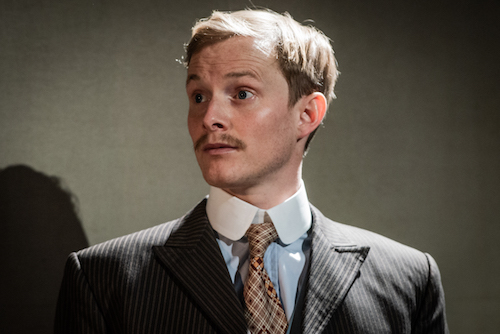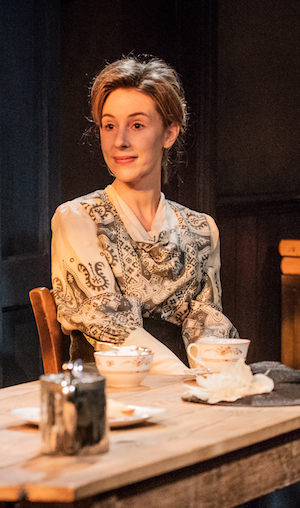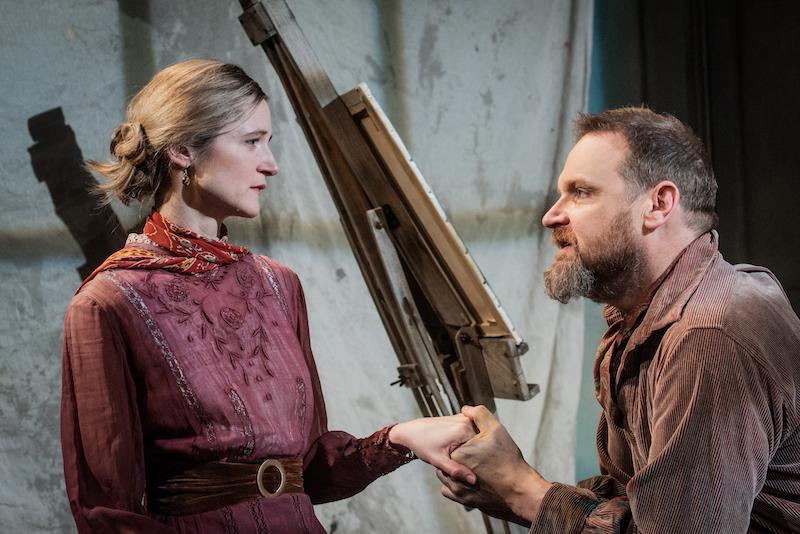Remembering meeting Harley Granville Barker when casting him as Marchbanks in Candida, Shaw described the 23-year-old as, "altogether the most distinguished and incomparably the most cultivated person whom circumstances had driven into the theatre at that time." He judged his performance as the romantic poet "perfect". At just this point in his career, Granville Barker was writing Agnes Colander, subtitled "An Attempt at Life", a typescript of which was only rediscovered a few years ago by two Granville Barker enthusiasts, the American playwright Richard Nelson and the critic Colin Chambers. Nelson's version of it was produced for the first time at the Ustinov Studio in Bath last year, directed by another Barker devotee, Sir Trevor Nunn.
Granville Barker was a remarkable man of the theatre, way ahead of his time, advocating a National Theatre, instigating a repertory system, arguing against censorship, establishing the role of the modern director and writing ground-breaking plays and, later, still-valuable Prefaces to Shakespeare.
Any play by this giant of the theatre must be considered a find. Nelson says in the Introduction to the published script that he has made no effort to change meaning, only to clarify where the typescript, covered in pencil corrections, in unclear. The result, we must assume, is as close as possible to the original. In 1929 Barker scrawled on the typescript that he suspected it to be "very poor. It should certainly not be published. It might well be destroyed." In 1932 he underlined the word "destroyed". And yet he kept it and it was still with him when he died in Paris in 1946.
Nunn has suggested on these pages that Barker perhaps thought that, given its unconventional view of a woman's role, he wouldn't get the script past the censor. Isn't it just as likely that Barker knew that he had the kernel of a good play, but always intended to tinker with it further? Chambers and Nelson say they believe what we have is a draft. Barker often rewrote: there are several published versions of his best-known works, Waste, The Voysey Inheritance and The Madras House.
On the evidence of this production, now transferred to the tiny Jermyn Street venue, Agnes Colander is not entirely satisfactory as it stands. Nunn's production makes the most of Barker's naturalistic dialogue in the rather slow early scenes, but when the interaction becomes more intense in the final act, the melodramatic archness is in danger of becoming risible. Throughout, Agnes herself is a fascinating creation, full of contradictions and confusions, a strong woman struggling with self-doubt, bravely, tentatively, searching for her place in the world, believing in marriage but turning her back on it. All this Naomi Frederick expresses with glowing naturalness and sincerity.
 Having left an unsatisfactory marriage, Agnes has set out on her own, pursuing her ambition to be an artist, despite doubting her ability. She has two male friends: Otho, whom Barker describes as a man of "undisciplined power, with the occasional wilful effort at self-control" and the boyish idealist, Alec, both vying for her attention. Agnes exchanges her single status for life with Otho in Normandy. As Otho, Matthew Flynn is coarse, earthy, bluntly self-regarding and, exemplified by his greedy devouring of chicken, more interested in satisfying his appetites than tending to a sympathetic relationship. Harry Lister Smith's Alec (pictured above) is naif and just a bit prissy. Agnes seems so far not to have learned much about men in her "attempt at life" and it's hard to see what she finds in either.
Having left an unsatisfactory marriage, Agnes has set out on her own, pursuing her ambition to be an artist, despite doubting her ability. She has two male friends: Otho, whom Barker describes as a man of "undisciplined power, with the occasional wilful effort at self-control" and the boyish idealist, Alec, both vying for her attention. Agnes exchanges her single status for life with Otho in Normandy. As Otho, Matthew Flynn is coarse, earthy, bluntly self-regarding and, exemplified by his greedy devouring of chicken, more interested in satisfying his appetites than tending to a sympathetic relationship. Harry Lister Smith's Alec (pictured above) is naif and just a bit prissy. Agnes seems so far not to have learned much about men in her "attempt at life" and it's hard to see what she finds in either.
Nunn is keen to emphasise that "the sex question" refers, not just to gender inequality but to female desire. The boorish Otho perhaps satisfies this in Agnes for a time, but she shows little relish for it. Sally Scott's lively Emmeline (pictured right), the conventional but flirtatious widow next door, is a reminder of the more usual contradictions for women of the time. Emmeline likes to be kissed, even by someone else's husband, but she would "cut" Agnes in public.
Robert Jones transforms the cramped acting space into a cluttered artist's studio, and then, aided by Paul Pyant's atmospheric lighting and Fergus O'Hare's sound design, an airy French house by the sea.
If Agnes Colander looks like a work in progress, it is valuable work, investigating the shifting area between lust, love and friendship and examining the true nature of freedom. Agnes does not slam the door on convention in the manner of Ibsen's Nora, but sets out rather more quietly on a new experiment, to choose how to live as she wishes, a "man-like" idea.















Add comment